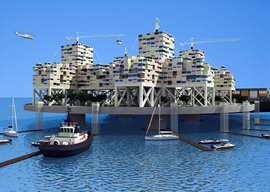
April 23, 2012

Seasteading and related ideas have been common in libertarian circles over the years. There are a half-dozen or so examples of attempts at this sort of thing, with varying levels of comedic puissance. One example seems most comparable to the modern efforts. As with the Seasteading Institute, it was started by libertarians and funded by a wealthy benefactor (in this case, Michael Oliver). Unlike the Seasteading Institute, these guys actually got beyond the kaffeeklatsch stage.
Their first project, the Republic of Minerva, was a 15-acre platform and tower built on a South Pacific coral reef in 1972. The idea was to make money issuing flags of convenience to ships and perhaps open a Sin City-style seaside resort to take advantage of the fine climate. Unfortunately, they announced their New Jerusalem to regional governments as well as potential investors. A local heavyweight, King Taufa’ahau Tupou IV of Tonga, decided that new land was his, despite it being 260 miles from Tonga. Reports differ as to the Republic of Minerva’s conquest, but it allegedly was a festive affair with brass-band accompaniment. No Minervans were present to contest the invasion. The Tongans didn’t stay the night; there isn’t much to do on an otherwise uninhabited coral reef.
Michael Oliver later started a group called the Phoenix Foundation with famed investment advisor Harry D. Schultz and objectivist pinup boy Nathaniel Branden. The goal was to set up a South Pacific libertarian paradise on an island called Espiritu Santo in the New Hebrides. The New Hebrides was set for independence from its British/French condominium in 1980, and the Oliver gang was backing a local pro-independence group. This time, it almost worked: The French recognized their independence on June 3, 1980. The rest of the newly independent New Hebrides didn’t think much of this, so they obtained military assistance from the mighty nation of Papua New Guinea and crushed the libertarian rebellion in the appropriately named Coconut War.
Michael Oliver’s efforts ought to be an object lesson to would-be seasteaders. You can’t have a real country without actual human beings who have skin in the game. In fact, you need bona-fide desperados who are willing to fight for their freedom, which is presumably why Mr. Oliver became interested in backing local rebels.
It’s not so clear that libertarians have a clear grasp of human nature. If the libertarians won the Coconut War, their libertarian paradise in the New Hebrides would probably have ended up much like the rest of the New Hebrides, as there weren’t many libertarians living there.
Seasteading has libertarian goals, but some kind of central planning system is needed to manage large, man-made structures. Whether you call it “taxes” or “use fees” isn’t going to matter much to the captive audience that lives there. Opportunists are going to be extremely interested in what you’re up to in your libertarian paradise. If it’s offensively illegal, they’re probably going to squash it as the authorities eventually did in Hong Kong’s anarcho-capitalist paradise of Kowloon Walled City. Considering the experiences of Mr. Oliver and his associates, diplomats and a well-organized militia would seem essential (if expensive) ingredients. Until libertarians are willing to fight for their liberty, the idea seems unlikely to work.